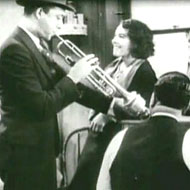
Screening this Sunday and Monday as part of the Film Society of Lincoln CenterÔÇÖs series Faded Glory: Oscar Micheaux and Pre-War Black Cinema, 1929ÔÇÖs Black and Tan Fantasy contains Duke EllingtonÔÇÖs first-ever film appearance. As such, itÔÇÖs a part of both cinema and music history, even though, as a film, itÔÇÖs basically an excuse to showcase EllingtonÔÇÖs musicianship. What plot it has is minimal: Duke struggles briefly with two piano movers (whose stereotypical depiction is pretty sad and discomforting, at best), then he performs onstage at the Cotton Club. There, the dancer Fredi Washington (playing herself, in a pretty amazing performance that marked her film debut as well) collapses and, on her deathbed, requests that Duke play ÔÇ£Black and Tan.ÔÇØ That description, of course, does no justice to the beauty of the music, or to the hypnotic energy of the dance performances, or even the occasional bits of style that director Dudley Murphy throws our way. At times, itÔÇÖs even possible to sense that this was the same Dudley Murphy who collaborated with Fernand L├®ger on Ballet M├®canique, one of the seminal films of the early avant-garde. But in the end, this one is all about Duke.
Part 1:
Part 2:


